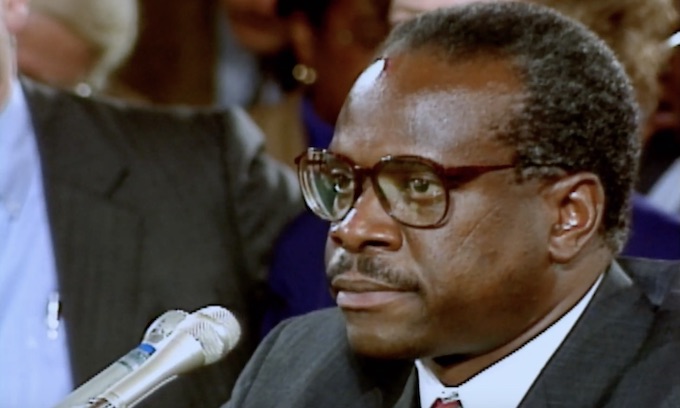“Created Equal” is a recently released documentary about the life of Supreme Court Justice Clarence Thomas. It is a viscerally powerful journey through tumultuous times, both in Thomas’s life and in the life of our nation during the era of segregation, through the Civil Rights movement and into the Senate Judiciary Committee room for Thomas’s confirmation hearings.
The movie opens with an evocative view of Georgia’s meandering swampland near where Clarence Thomas was born. It is a scene that reoccurs throughout the film as forks in the road of Thomas’s life present choices he must make, some of which are gut-wrenching.
Clarence Thomas and his brother were born into poverty. After their father left, they lived for a period of time with their mother until her parents took the boys in to raise them. It was Thomas’s grandfather who provided stern discipline and instilled a hard work ethic that took root in Clarence’s character and carried him through unimaginably challenging times as a young black man in a white man’s world.
In this short commentary, I cannot do justice to the fortitude displayed by Clarence Thomas as he navigated Catholic school, seminary, Holy Cross College, Yale Law School, the Missouri Attorney General’s office, Monsanto Chemical Company, the Senate Commerce Committee, Department of Education, Chairman of the US Equal Employment Opportunity Commission, DC Court of Appeals Judge, and finally as an Associate Justice of the Supreme Court.
At each fork in the road, Thomas weighed his opportunities. Sometimes, he abruptly changed course when racism reared its ugly head. But he did not change course when stakes perhaps were highest, during Senate Judiciary Committee hearings for his confirmation to the Supreme Court.
It was during those confirmation hearings that Clarence Thomas delivered a stunning rebuke to the all white, all male Senate Judiciary Committee chaired by then Senator Joe Biden. Thomas declared that the hearings were, “a high-tech lynching for uppity blacks who deign to think for themselves, to do for themselves, to have different ideas, and it is a message that, unless you kowtow to an old order, this is what will happen to you. You will be lynched, destroyed, caricatured by a committee of the US Senate, rather than hung from a tree.”
Fast forward to June 2015 when Donald Trump declared his candidacy for President and vowed to return governing power to the people. Like Clarence Thomas, President Trump refuses to kowtow to an old order, and for that he, too, has been vilified.
To digress for a moment, consider the political division in our country that has emerged over the last three decades, and how it is reflected in a series of Senate votes. On October 15, 1991, the Senate confirmed Clarence Thomas to the Supreme Court on a vote of 52-48, after unproven salacious allegations of sexual misconduct. Twenty-seven years later, the Senate confirmed Brett Kavanaugh to the Supreme Court on a vote of 50-48 after unproven salacious allegations of sexual misconduct.
When it came time for President Trump’s impeachment trial in the Senate, that body refused to re-do what should have been the work of the House of Representatives and, by a vote of 51-49, refused to call additional witnesses. (This was after the President was denied basic due process protections in the House.) Final votes to acquit were 52-48 (Article 1) and 53-47 (Article 2).
Look again at those vote margins. As the old adage goes, the more things change, the more they stay the same. Statesmanship has given way to hyper-partisan gamesmanship, increasingly driven by the radical / Progressive political Left.
Clarence Thomas Is a kind of North Star among our governing institutions. He holds firmly to Constitutional principles that offer guideposts to the functioning of a healthy Republic. Even if you don’t always agree with his legal opinions, he deserves admiration for his formidable work ethic, disciplined intellect, reverence for the Constitution, and strong religious convictions.
“Created Equal” is showing at the AMC Georgetown 14 movie theater. Please make a point of seeing it. Prepare to be deeply moved by the life and words of Clarence Thomas.

